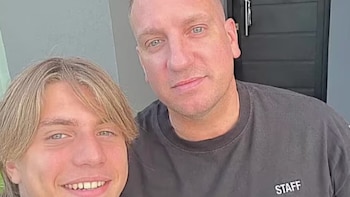
There is one of the 32 sports included in the Paris 2024 program whose competitions will take place entirely outside the French continental borders. Just as the horseback riding from Melbourne 1956 moved to Stockholm, surfing will take place in Teahupo’o, Tahiti, a territory of French Polynesia located 15,700 kilometers from the epicenter of the Games.
Far from the calm waters, the prelude to the second Olympic experience of the boards was mistreated, until last Sunday, by a wave of noise surrounding the organization’s controversial project to remove the historic wooden control tower for judges -used for the World Surf League- and install another aluminum one, larger (14 meters) and valued at 4.3 million euros, which the community of 1,500 inhabitants, surfers such as Matahi Drollet and Kanoa Igarashi, associations and various environmental NGOs identified as highly harmful to the coral reef and marine wildlife and they lobbied intensely to stop the execution.
One of the sharpest points of contention occurred during the technical tests on December 1, when a barge involved in the works caused damage to the corals. The result: the Polynesian government paralyzed the works, a decision then applauded by the International Surf Association (ISA). The pressure continued and on Saturday, December 9, the US Surfrider Foundation urged the IOC to consider “other solutions, including other competition venues”, by attacking “the traditions and interests of Tahitians”.
However, the agreement arrived and, after a meeting with environmental groups and the approval of the ISA, Moetai Brotherson, the president of French Polynesia who had insisted on changing powers since November, confirmed that Tahiti remains the headquarters and that the installation of the new control tower will be a fact, although with probable modifications in the work plan and in the initial dimensions of the structure.
Brotherson set the installation’s completion date for May 13, on the prelude to the World Surf League. The stipulated deadline was welcomed by Tony Estanguet, president of the Paris 2024 Organizing Committee, who was optimistic that the project will be implemented in a timely manner.

Last week, a categorical - and premonitive - statement had emerged from the figure of Amélie Oudéa-Castéra. Embraced the premise that the new tower did not pollute, the sports minister had closed the door to any movement: “There is no plan b, this is the right path”.
If the change took place, the French cities of Lacanau and La Torche sounded like the main alternatives. In fact, the authorities of the second were especially waiting for a possible move, to the point that they had demanded an official definition before Christmas.
The two surfing competitions - men’s and women’s shortboard - will take place between July 27 and 30. It is the only discipline that does not sell tickets to the general public.
Últimas Noticias
Sinner-Alcaraz, the duel that came to succeed the three phenomenons
Table tennis: Brazil’s Bruna Costa Alexandre will be Olympic and Paralympic in Paris 2024

Rugby 7s: the best player of 2023 would only play the medal match in Paris

Rhonex Kipruto, owner of the world record for the 10000 meters on the road, was suspended for six years

Katie Ledecky spoke about doping Chinese swimmers: “It’s difficult to go to Paris knowing that we’re going to compete with some of these athletes”




